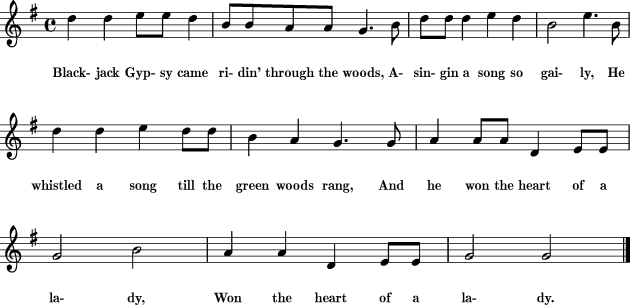Black Jack Davey- Riddle (AR) 1964 REC
[From Songs and Ballads of the Ozarks / Almeda Riddle. New York: Vanguard, 1964. Vanguard VRS-9158; also on Songcatcher II. Below is some information on Riddle.
R. Matteson 2015]
Almeda Riddle's Views on Songs by Daniel W. Patterson
Almeda had her own ideas about the songs she learned from her family and community. Her father, after singing ballads to her when she was very small, wanted her to learn to read music and began singing her mainly the gospel-tune-book songs. Almeda enjoyed those too, but she favored songs that told a story and tried to get them from everyone else. Almeda’s mother knew some of the oldest ballads, but she was reluctant to sing ones she thought risqué. Because “Black Jack Davy,” for example, told of the elopement of a girl with a Gypsy boy, she would sing only “little snatches” of it. Almeda never saw “anything particularly bawdy” in the song. Those things, she said, “happened then and they still do today.” So she got the words from an uncle and sang the song.
Almeda Riddle was born in 1898—and was a child born to sing. From the first, singing both drew her and enveloped her. Her father—a key influence—sang her to sleep with ballads when she was small. He opened and closed each day by singing from shape-note gospel tune books, his passion. She sang with him. Everywhere he lived he taught singing schools, and Almeda went along. She said that before she could read words she learned to read musical notation, and, like her father, she could write down tunes she heard.
She grew up in the southern edge of the Arkansas Ozarks in the years before the radio. Pianos were too expensive for ordinary people to own, phonographs were rare, and traveling musical shows did not come to her community. For entertainment most people simply sang. Almeda described singing when she visited with friends or walked to school or even worked at home. In one of the many interviews that folklorist Roger Abrahams edited into the book A Singer and Her Songs she told of first learning “No Telephone in Heaven” when she was a child of seven and singing it over and over while she was out with others picking cotton. One man in the group finally offered her twenty-five cents if she “would please just not sing ‘No Telephone in Heaven’ again that day.”
People in the community habitually exchanged written copies—“song ballads” or “ballets,” they called them—of pieces that struck their fancy. Almeda began collecting these as soon as she could read and in her interviews constantly mentioned ballets she begged from parents, uncles, cousins, neighbors, school mates, her future husband, or his preacher friend. She lost the collection in a tornado that destroyed her house in 1926. But one ballet that she later found tucked into a book at her mother’s home gives a direct glimpse of her childhood passion for songs. Her Uncle John had written it for her in 1906, and Almeda said he added in a note that she pestered him until he finally sang her a song. He “promised to write the ballet and give it to me if I would go to bed.”
BLACK JACK DAVEY- Almeda Riddle from Songs and Ballads of the Ozarks / Almeda Riddle. New York: Vanguard, 1964. Vanguard VRS-9158; The sheet music below, from Mudcat an online source, claims the melody is Riddle's. The text however does not match. Listen: Youtube http://www.youtube.com/watch?v=ubSUG4qR5SY

Black Jack Davey came riding by,
Whistling so merrily
He made the woods all around him ring
And he charmed the heart of a lady
And he charmed the heart of a lady
Come with me my pretty little one,
Come with me my honey
I swear by the beard upon my face
You'll never want for money
You'll never want for money
She took off her high heeled boots,
Made of spanish leather
Jumped behind him on his horse
And they rode off together
And they rode off together
That night her husband, he came home,
Looking for his lady
The maid she spoke before she thought
She's gone with the Black Jack Davey
She's gone with the Black Jack Davey
Saddle me up my coal black steed,
The white one's not so speedy
I rode all day, and I'll ride all night
And I'll overtake my lady
And I'll overtake my lady
He rode all night till the broad daylight,
The come to the river shady
And there he spied his own sweet bride
In the arms of Black Jack Davey
In the arms of Black Jack Davey
Would you forsake your house and home,
Would you forsake your baby
Would you forsake your own wedded lord
To ride with the Blackjack Davey
To ride with the Blackjack Davey
Last night I slept in a goosefeather bed,
Beside my husband and baby
Tonight I sleep on the cold, cold ground
In the arms of Black Jack Davey
In the arms of Black Jack Davey